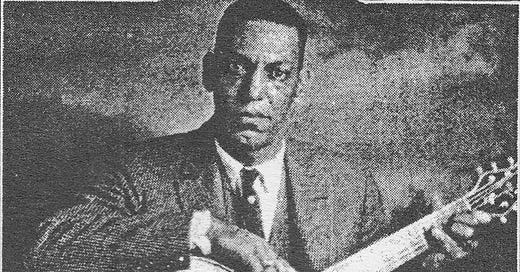Papa Charlie Jackson: The First Popular Bluesman
The Life, Times, and Music of a Flatpicking Pioneer
The first commercially successful male blues artist, Papa Charlie Jackson sang with a relaxed, confident voice and usually played an unusual 6-string guitar-banjo. He began recording for Paramount in 1924 and produced nearly three dozen 78s by 1930. His versions of “Salty Dog,” “Shake That Thing,” “I’m Alabama Bound,” and “All I Want Is a Spoonful” set the template for countless covers to come.
Playing finger-style or with a flatpick, Papa Charlie conjured a strong, staccato attack on his big guitar-banjo. His unstoppable rhythms were perfectly suited for dancing, and he was one of the first bluesmen to flatpick solos on record.
Even during his prime, Papa Charlie’s old-time approach may have seemed an anachronism. But like Jim Jackson, Gus Cannon, Charley Patton, Henry Thomas, Lead Belly, and other recording artists born in the 1880s or earlier, his non-blues records struck a resonant chord among listeners and provide us with examples of what Black music sounded like before the turn of the 20th century. Jackson, most likely born in New Orleans on November 10, 1887, had a special affinity with ragtime and minstrel fare. It’s likely he toured with medicine and minstrel shows before World War I.
By 1920 Papa Charlie Jackson had settled in Chicago, where he gave guitar lessons, worked in clubs, and played for tips along Maxwell Street, probably performing ragtime. Rev. Thomas A. Dorsey, who recorded blues as Georgia Tom, explained to Living Blues that when he arrived in Chicago from Atlanta in 1919, “Wasn’t much of the blues then. Ragtime. See, you didn’t have the blues singers. The blues wasn’t recognized until the blues singers got a break, till they got a chance [to record], see. And then the blues began to spread. Blues singers came in by the score. Well, they had had them before, but they had no place to sing them, to exhibit what they had. And when they started to making these records of blues singers, that was all we all needed.”
Keep reading with a 7-day free trial
Subscribe to Talking Guitar ★ Jas Obrecht's Music Magazine to keep reading this post and get 7 days of free access to the full post archives.



